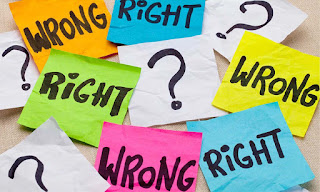Role of Ethics in Disaster Management
Abstract
Environmental ethics,
ethical questions raised by the human relationship with the non-human
environment, ethical divergences and dilemmas between the pursuance of
developmental goals and ethical values – all these form the crux of the debate over the role of ethics in Disaster
Management. In the context of preventing disasters, the decisions taken on the
basis of ethics may have significant and lasting impacts on the communities.
But the vested motives of the capitalists overshadow the community interests
and they often end up choosing between the undesirable alternatives.
Introduction
What are
ethics?
Ethics is a set of
moral philosophy that deals with the
concept of right or wrong. Now what is right or not can substantially be
different for everyone and this is why most of the times ethical dilemmas
occur. But still, by having a perspective of the larger good of the nation, there are
some generalized phenomena of right and
wrong.
What is
disaster management?
It includes those
measures that are undertaken to prevent or cure a disaster or an emergency
situation towards which attention needs to be paid.
Role of
Ethics in Disaster Management
How are ethics related to disaster management?
Ethics are the guiding force that influences the decision makers and so the
decisions taken with respect to disaster management issues.
No year is escapable
of natural disasters, mild and strong, for the earth. But is it right to call
them “natural disasters?” It is often witnessed that the causes of these
disasters, which are generally termed as “natural”, are actually man-made; so
why don’t we refer to them as man-made disasters? The answer is simple, no one
wants to be tagged. If they are termed as man-made disasters instead of natural
ones, it will raise a plethora of questions against the authorities, the
citizens, the government, and everyone, to which no one can answer. Who wants
to be held accountable when any such disaster occurs, who wants to take the
responsibility of it, who wants to be ashamed of such a big mistake?
Most of the disasters
occur due to the human errors, to name a few, the recent Kerala Floods (2018),
flash floods of Uttarakhand (2013) in India, Fukushima Daiichi nuclear disaster
in Japan (2011) and Chernobyl disaster in Pripyat (1986), and yet there are
many more. Unplanned development, over-exploitation of resources, negligence
towards ecological recommendations and safety measures, poor governance, poor
implementation of environmental laws, human ignorance, etc. are some of the
major human errors that lead to such disasters. These human errors are not
committed by mistake but in full consciousness. We are well aware of their consequences
but we do not pay a heed to them because of our greed and other selfish
motives. I am not blaming only the
authorities and government because in many cases, the residents are also not
the saints. This is the point where the role of ethics comes into place.
According to ethics, we should not commit these human errors as they are
totally in human control. There can be explanations for the factors that are
not in our hands but no explanation can justify the factors that are absolutely
human-driven. Even the explanations given
in defense of such human errors are nothing but void.
The ethics do not stop the world from progressing rather
it complements the development procedures. The development without ethics is
only short-lived and can have devastating impacts on human life but the
development along with ethics is the development in a true sense. The notion of development we carry
today is a hollow one, we think only the big industries and lavish infrastructure encompasses the development but we
forget the well-being and healthy survival of the people. True development is
not only about industries and infrastructure but also about peace and health.
It is our moral
obligation to abide by the environmental laws, practice sustainable activities
and undertake development within the ecological norms. Ethics is following this
moral obligation but I wonder even if the 10%
population of the world is fulfilling this moral obligation. Seeing the extent
of destruction on the earth, increasing global warming, and unstoppable
disasters, it can be said that human beings have forgotten their ethics.
Let me use the
example of the recent Kerala floods. Ethics said that there should have been a
ban on the new industrial and mining activities, as prescribed in a 2011 report
by Gadgil committee but if it would have happened there would have been a loss
of revenue to the state. Ethics was to keep in mind the sensitivity of Western
Ghats and to follow the coastal planning regulations. But as all these ethics
were neglected to a great extent by the state, the state is facing its fate
now. This is the most relevant example of the consequences of not working with
ethics. If the state would have adopted some rationality, pursued the
developmental goals along with the ethics and fulfilled its moral obligation,
the state would not have been facing this devastating disaster. This proves
that ethics play an important role in the disaster management.
Conclusion
The need of the hour
is to respect the nature, proper implementation of environmental laws and
self-conscious and responsible behavior of human beings.
The methodology needed
for ethical decision making must reflect the complexity of human and
international relationships, technological developments, environmental
vulnerability, and interdependency.
We can’t shift over
all the responsibility and blame over the government. Being the part of this
society, we are equally possible for all the events and happenings. This is the
high time when we have to understand what is good for us and what is not;
undertake our decisions on the basis of what is right and what is wrong. We need
to share the burden of healing nature and managing disasters; support and
compel governmental authorities and other civil societies to do the
needful.
“Make
your moves with ethical values to sail across the ocean smoothly.”



Comments
Post a Comment